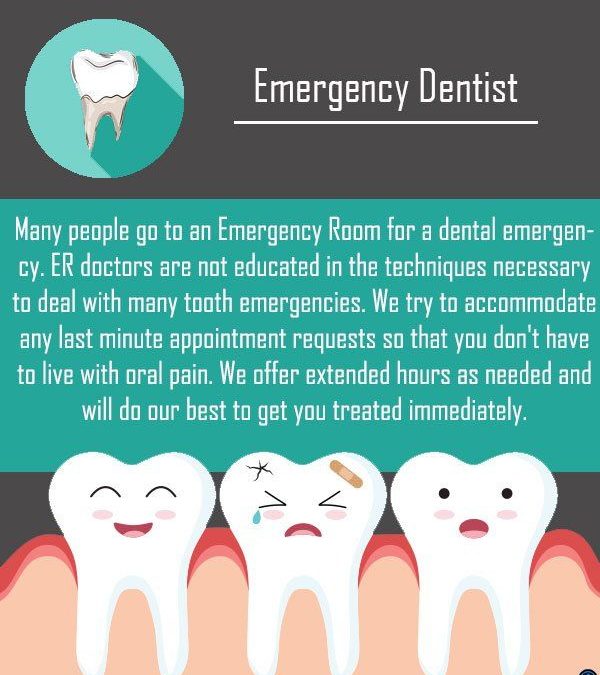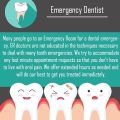Have you ever wondered if it’s absolutely necessary to contact an emergency dentist for every dental issue you encounter? From toothaches to cracked teeth, it’s natural to have concerns about a sudden dental problem. In this article, we’ll explore the importance of seeking emergency dental care and discuss the scenarios when contacting an emergency dentist is crucial. So, if you’ve ever found yourself unsure about when to call for immediate dental assistance, read on to find out more.
Understanding Dental Emergencies
Dental emergencies refer to urgent dental conditions that require immediate attention from a dentist to alleviate pain or prevent further damage. These emergencies can range from severe tooth pain to broken or knocked-out teeth. It is important to distinguish between a dental emergency and a non-emergency to determine when to seek immediate dental care.
Definition of a dental emergency
A dental emergency is a situation where there is severe pain, bleeding, swelling, trauma, or damage to the teeth or mouth that requires immediate attention from a dentist. It is important to note that not all dental issues are emergencies, and some can be addressed through regular dental appointments.
Examples of dental emergencies
- Severe tooth pain: Intense and persistent toothache that affects your daily activities and disrupts your sleep.
- Facial swelling: Swelling of the face, particularly around the mouth or jaw, which may indicate an infection or injury.
- Bleeding or trauma to the mouth: Excessive bleeding from the mouth due to an injury or accident that requires immediate medical attention.
- Loose or knocked-out tooth: When a tooth becomes loose or is completely knocked out, immediate dental care is necessary to increase the chances of saving the tooth.
- Broken or cracked tooth: Cracked or fractured teeth can cause severe pain and expose the inner layers of the tooth to bacteria, leading to potential infections.
- Lost dental crown or filling: The loss of a dental crown or filling can expose the underlying tooth to further damage or decay.
When to Contact an Emergency Dentist
Knowing when to contact an emergency dentist can save you from unnecessary pain and complications. It is crucial to recognize the signs and symptoms that indicate the need for immediate dental care.
Severe tooth pain
If you experience intense tooth pain that lasts for an extended period or intensifies over time, it is important to contact an emergency dentist. This could be a sign of an underlying infection or tooth decay that requires immediate attention.
Facial swelling
Facial swelling around the mouth or jaw area can be an indication of an infection or injury that needs immediate dental care. It is essential to address the underlying cause of the swelling to prevent further complications.
Bleeding or trauma to the mouth
Excessive bleeding from the mouth due to an injury, accident, or trauma requires immediate medical attention. In these cases, it is crucial to contact an emergency dentist or visit an emergency room to address the bleeding and assess any potential damage to the teeth or mouth.
Loose or knocked-out tooth
If a tooth becomes loose or is completely knocked out, it is considered a dental emergency. Promptly contacting an emergency dentist increases the likelihood of saving the tooth. In the case of a knocked-out tooth, it is crucial to handle it carefully, avoiding touching the root, and keep it moist by placing it in milk or saliva until you can see a dentist.
Broken or cracked tooth
A broken or cracked tooth can cause severe pain and expose the inner layers of the tooth to bacteria, leading to infections. Seeking immediate dental care allows the dentist to assess the extent of the damage and provide appropriate treatment to prevent further complications.
Lost dental crown or filling
A lost dental crown or filling exposes the underlying tooth to potential damage or decay. Contacting an emergency dentist will allow them to evaluate the situation and provide a temporary solution until a permanent restoration can be placed.
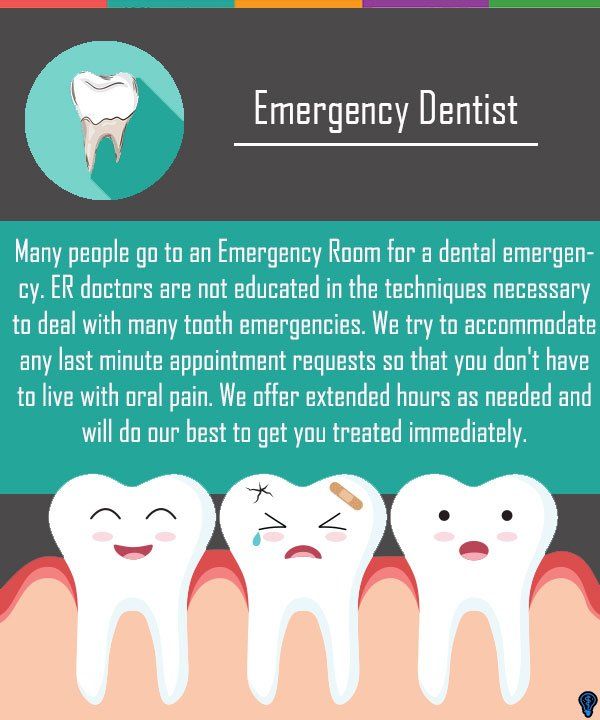
Dealing with Non-Emergency Dental Issues
Not all dental issues require immediate attention from an emergency dentist. Some problems can be managed at home or addressed during a regular dental appointment. Here are examples of non-emergency dental issues and how to deal with them:
Toothache without severe pain
If you experience a mild toothache without severe pain, you can try rinsing your mouth with warm saltwater to alleviate discomfort. Over-the-counter pain relievers may also provide temporary relief. However, if the pain persists or worsens, it is advisable to schedule a dental appointment to address the underlying cause of the toothache.
Mild gum or tooth sensitivity
Mild gum or tooth sensitivity can often be managed by using desensitizing toothpaste or avoiding foods and drinks that trigger sensitivity. However, if the sensitivity becomes severe or persists for an extended period, it is recommended to consult a dentist to determine the cause and appropriate treatment.
Small chip or minor tooth damage
If you have a small chip or minor damage to a tooth that does not cause pain or discomfort, it may not require immediate attention. However, it is still advisable to schedule a dental appointment to prevent further damage or aesthetic concerns.
Dull toothache with no other symptoms
A dull toothache without other symptoms may not be considered a dental emergency. However, if the pain persists or other symptoms develop, such as swelling or sensitivity, it is important to seek dental care to identify the cause of the toothache.
Seeking Immediate Self-Help Remedies
While waiting for a dental appointment or during a dental emergency, there are self-help remedies that you can try to alleviate pain and discomfort. These remedies are temporary measures and should not replace professional dental care.
Rinsing with warm saltwater
Rinsing your mouth with warm saltwater can help reduce inflammation, alleviate pain, and promote healing in case of gum infections or minor oral injuries. Mix half a teaspoon of salt in eight ounces of warm water and swish the solution around your mouth for about 30 seconds before spitting it out.
Over-the-counter pain relievers
Over-the-counter pain relievers, such as ibuprofen or acetaminophen, can help temporarily alleviate dental pain. Follow the instructions on the packaging and consult with a healthcare professional if you have any concerns or medical conditions.
Applying a cold compress
In case of facial swelling or pain, applying a cold compress to the affected area can help reduce inflammation and numb the area, providing temporary relief. Wrap an ice pack or a bag of frozen vegetables in a thin cloth and apply it to the swollen or painful area for about 15 minutes at a time, with breaks in between.
Using dental wax or temporary filling material
If a filling or dental crown falls out and you cannot see a dentist immediately, dental wax or temporary filling material can be used to cover the exposed area temporarily. This helps protect the tooth from further damage or sensitivity until you can see a dental professional.
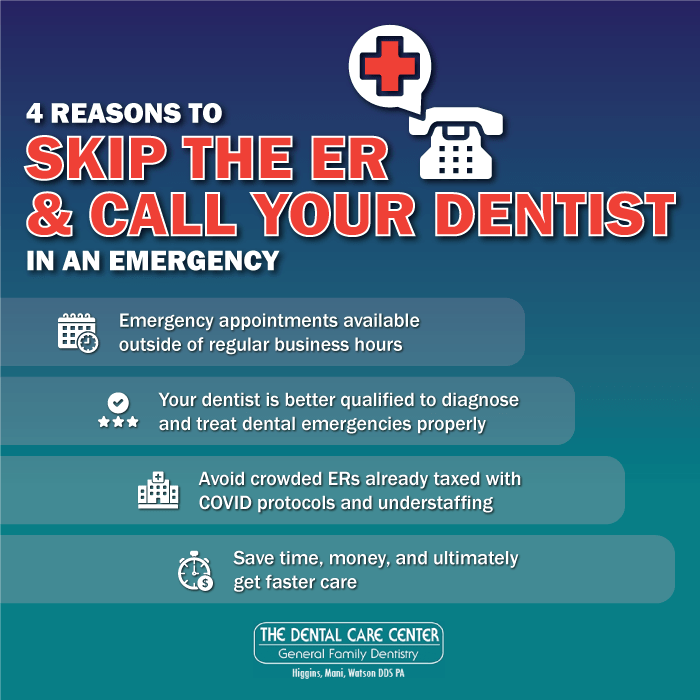
The Importance of Prompt Treatment
Seeking prompt treatment for dental emergencies is crucial for several reasons. Delaying or neglecting immediate dental care can lead to significant consequences, including further damage, increased risk of infection, and prolonged pain and discomfort.
Preventing further damage
Immediate dental care can prevent further damage to the teeth, gums, or surrounding tissues. Ignoring a dental emergency may result in irreversible damage or the need for more extensive and costly dental procedures in the future.
Avoiding worsening of infection
Dental infections can spread if left untreated, potentially affecting other teeth, the jawbone, or even reaching the bloodstream. Seeking immediate treatment for infections can prevent the spread of bacteria and the development of complications.
Preserving tooth structure
Prompt treatment for a loose, broken, or knocked-out tooth increases the chances of preserving the tooth. Dental professionals have the necessary knowledge and tools to reposition a tooth, repair fractures, or provide appropriate treatment to prevent tooth loss.
Minimizing pain and discomfort
Dental emergencies are often accompanied by severe pain and discomfort. Seeking immediate dental care will help alleviate pain through appropriate treatment or prescription medication, providing much-needed relief and improving your overall well-being.
Considerations for After-Hours Dental Care
Dental emergencies can occur outside of regular office hours, leaving you wondering how to access immediate dental care. In such cases, it is important to be aware of available options and how to find a dentist who can provide after-hours care.
Availability of emergency dental clinics
Many areas have emergency dental clinics or practices that specialize in providing immediate care for dental emergencies. Research and contact local clinics to inquire about their after-hours services and availability.
Contacting an on-call dentist
If you are unable to find an emergency dental clinic, contacting an on-call dentist through their emergency contact number may be a viable option. Dentists often have systems in place to handle urgent cases outside of regular office hours.
Emergency room as a last resort
In extreme cases where immediate dental care is not accessible, visiting the emergency room may be necessary. The emergency room can provide temporary relief for severe pain or uncontrollable bleeding until you can see a dental professional.
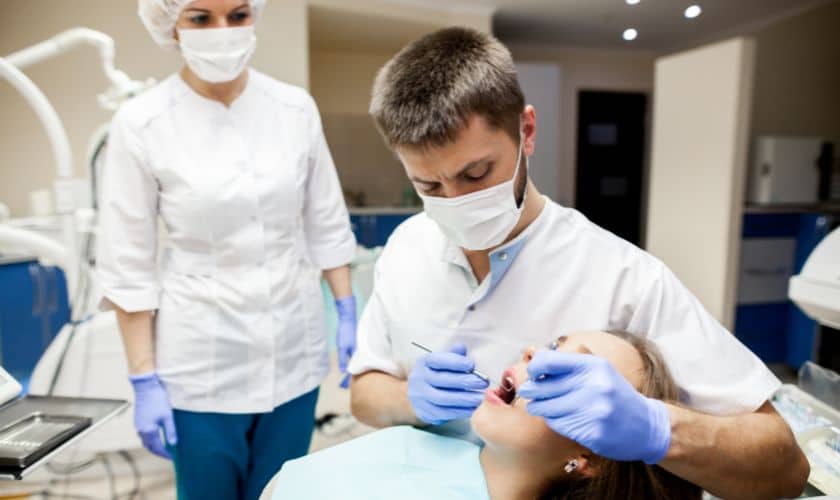
Costs Associated with Emergency Dental Care
Emergency dental care may come with higher fees compared to regular dental visits due to the urgent nature of the treatment and the need for immediate attention. It is important to be aware of the potential costs and consider the available options for payment.
Higher fees for immediate treatment
Given the urgent nature of dental emergencies, emergency dental care may involve higher fees than routine dental appointments. Factors such as the complexity of the procedure, after-hours care, and the need for specialized equipment may contribute to the increased cost.
Insurance coverage for dental emergencies
Dental insurance plans typically cover a portion of emergency dental care, but the coverage may vary depending on the plan. Before seeking emergency dental treatment, it is essential to check with your insurance provider to understand the extent of coverage and any associated limitations or requirements.
Financing options for emergency dental services
If you do not have dental insurance or your coverage is limited, many dental practices offer financing options to help manage the cost of emergency dental services. These options may include payment plans, dental credit cards, or third-party financing options. It is advisable to discuss these options with the dental office beforehand to make an informed decision.
Prevention and Regular Dental Care
Prevention is key to maintaining good oral health and avoiding dental emergencies. Regular dental check-ups and proper oral hygiene practices play a significant role in preventing dental issues from escalating into emergencies.
Importance of good oral hygiene
Maintaining good oral hygiene is essential in preventing dental problems. Brushing your teeth at least twice a day, flossing daily, and using mouthwash can help remove plaque, bacteria, and food particles, reducing the risk of tooth decay, gum disease, and other dental issues.
Regular dental check-ups
Regular dental check-ups are crucial in identifying potential dental issues before they become emergencies. Dentists can detect early signs of decay, gum disease, or other problems during routine examinations and provide appropriate treatment to prevent further complications.
Addressing dental issues before they become emergencies
Addressing dental issues promptly, even if they do not cause immediate pain or discomfort, can prevent them from developing into dental emergencies. Regular visits to the dentist allow for the early identification and treatment of problems, reducing the likelihood of more extensive and invasive procedures.
Conclusion
Knowing when to seek emergency dental care is important for your oral health and overall well-being. While not every dental issue requires immediate attention, it is crucial to recognize the signs of a dental emergency and take appropriate action. Prompt treatment for dental emergencies can prevent further damage, minimize pain, and preserve tooth structure. However, it is equally important to maintain good oral hygiene, schedule regular dental check-ups, and address dental issues before they become emergencies. By balancing the need for emergency dental care and preventive measures, you can promote overall dental health and ensure optimal oral well-being.

